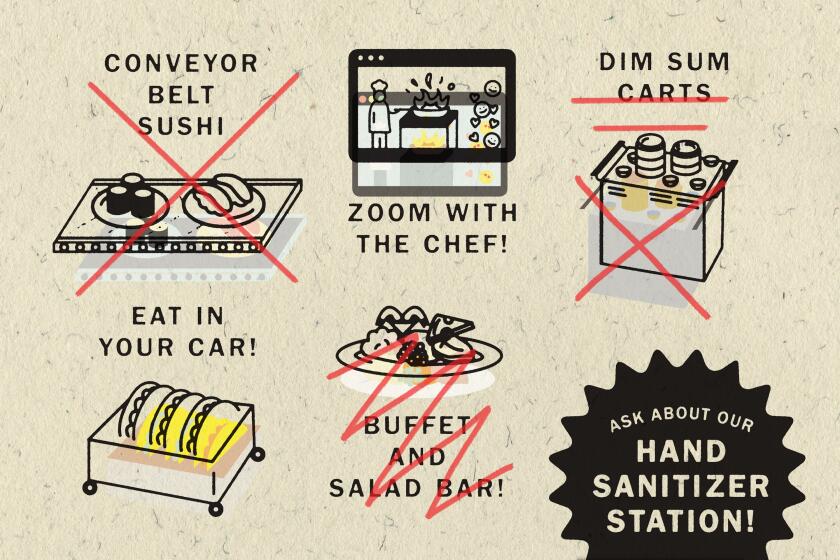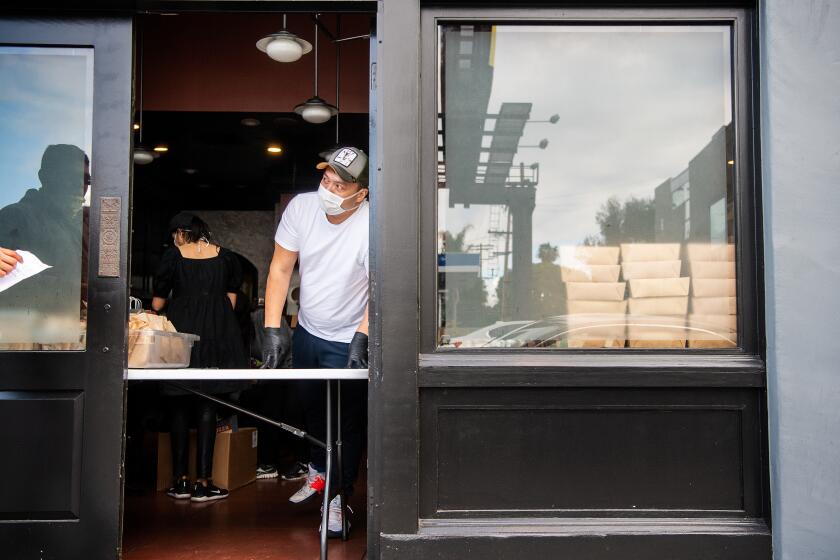‘Top Chef: All-Stars’ champ’s secret ingredient: San Gabriel Valley flavors
The following story contains spoilers from the season finale of “Top Chef All-Stars: Los Angeles.”
“Top Chef All-Stars: Los Angeles” came to a dramatic conclusion on Thursday night as the remaining three chefs — Bryan Voltaggio, Stephanie Cmar and Melissa King — were tasked with serving a group of international culinary legends in Tuscany, Italy. On the menu? “The best progressive four-course meal of your life,” said host, judge and executive producer Padma Lakshmi.
The Season 17 champion of the Bravo competition series was Melissa King, who paired her Italian techniques and local ingredients with the Chinese flavors of her San Gabriel Valley childhood: char siu glazed octopus with fennel, squash agnolotti with Szechuan chili oil, grilled squab with persimmon, porcini and fermented black bean, and Hong Kong milk tea tiramisu.
“It’s so nice to finally talk about it freely!” King said of the finale, which wrapped production back in November. The Season 12 alumna emerged victorious by creatively elevating humble Asian dishes to Michelin-star status. Her final dish of the competition brought eighth-generation Italian butcher Dario Cecchini to tears.
“It respected the traditions of Italy,” he explained. “Melissa made an interpretation of one of our traditions and she made it from the heart.”
The season, set in Los Angeles, aired as the food media scene grapples with its systemic racism and as crowds have misguidedly shunned Asian restaurants for fear of the novel coronavirus. King, who is based in the Bay Area but is currently sheltering in place with family in San Gabriel, spoke with The Times about drawing inspiration from the San Gabriel Valley and combining flavors without committing culinary appropriation.
For many, being allowed to again eat in public is a welcome small step away from where we are right now.
How did your life change after wrapping Season 12 in Boston?
“Top Chef” changed my personal life in that it brought me a lot closer to my father. Throughout the earlier years of my career, when I was in these Michelin-star kitchens, he just didn’t really show much interest in what I was doing. He never ate at a restaurant that I had worked at.
Sharing all of that on camera in Boston and how much I was affected by it, I think he just needed to hear that. He’s since flown to San Francisco and we eat around the city. He’s voiced how proud he is of me, which was something I really never heard. The show has opened so many doors of communication with him and allowed him to enter this culinary world that’s a major part of my life.Was your mindset different this time around?
Definitely. Before, I felt like I was doing the show for everyone else: because my friends were pressuring me to go for it; so I could try to please my dad. This time, I did “All Stars” completely for myself. I really tried to cook my food and not worry so much about what the judges would think. Like, I’m gonna cook this prosciutto even though everyone’s telling me I’m not supposed to, but it’s gonna taste good! I stuck to my gut and I’m glad I did.As a chef who grew up in the Los Angeles area, did you feel you had an advantage this season?
There was more a sense of comfort. Like going back to the Getty Museum, which was really my first professional kitchen job. I was 17 at the time, I had just graduated high school and I really wanted to cook. My parents were encouraging me to go to a “real” college, so I was moonlighting in the kitchen while going to UC Santa Barbara and then UC Irvine. I did that commute for several years because I loved learning about food so much.
Since my entire career has been in San Francisco and New York, I felt like I was discovering L.A. in a whole new way. L.A. is full of these different, beautiful ethnic neighborhoods, and being able to drive around town and see it from the perspective of a chef was mind-blowing. Jonathan Gold did a fantastic job exposing those places that do that type of food where it’s authentic at its core. It’s what you would eat at your Chinese grandmother’s house or your Mexican grandma’s house.
This season, you often drew inspiration from the flavors of your childhood. What is it about those tastes that excite you?
I grew up on the east side — in Hacienda Heights, a very Chinese-dominant neighborhood in the San Gabriel Valley. A lot of my life I felt I had to be more American, I needed to acclimate and blend in. As I said on the show, I was embarrassed because I had weird things in my lunchbox as a kid. But looking back on it now, I’m like, “I had the best lunch there!”
A lot of people have this perception of Chinese food being greasy and cheap and chop suey — which, I don’t even know what that is. Or that it has to be super spicy, like Szechuan chilies on chilies on chilies. There is that region, but think about it: China is huge! My family is from Hong Kong and Shanghai, so the flavors I grew up on were much more delicate and coastal seafood-focused. I hope people realize there’s so many layers to Chinese cuisine, and you’ve only touched the surface. Even me as a Chinese American, I’ve only touched the surface.A Hong Kong milk tea tiramisu sounds straight out of the 626.
Exactly! Growing up in the SGV, I drank bubble tea all the time, and they do this cheese foam on the bubble tea. I thought, it’s like tiramisu, this a classic Italian dessert where coffee is the main ingredient. The flavors came together in my head and it just evolved from there.How do you do that, without it falling into the trappings of culinary appropriation?
That’s what I always fear; that’s the last thing I want to do to someone’s culture. I do a lot of research, I travel to these countries, I eat the food of the locals as much as I can. I tried to keep the authenticity of the flavors and the tradition that is behind [it] in all of these cultures, but hybrid[ize] it in a way that’s very subtly and tastefully done. I hate to use the word “fusion” because it’s not. Fusion can be horrible; you fuse too many things together and it becomes a whole mess.
L.A. restaurants are hurting. Here are five simple things you can do to help.
The culinary industry has taken a big hit due to COVID-19. How have you pivoted?
COVID is showing us all how vulnerable the restaurant industry can be, and I hope we can continue to support restaurants right now because they’re really having such a hard time. I remember panicking a bit when I started getting events canceled, one after another. I was worried — what am I going to do? This is my bread and butter. I quickly found ways to bring those events virtually for people by hosting cooking classes: Everyone’s at home right now cooking three meals a day every single day and running out of ideas.
Once everything happened with Black Lives Matter, it really woke me up and made me realize I need to be a better human and do what I can to support. I’m not out protesting; I’m still being cautious because I’m here with elderly people and young kids. So now the cooking classes are benefiting different organizations.Now that you’ve won the biggest prize in “Top Chef” history, what are your next moves?
Before COVID, I really wanted to treat my family to an amazing international vacation somewhere, because they’ve been so supportive of me all these years, but unfortunately we can’t travel right now. The rest I would like to invest into some projects I want to work on, so I can continue to put food out there and feed people, which is what I really love to do.
While everyone’s at home, I recently started creating a small-batch sauce line, just to test the market, and I sold out a few hundred units in the first 30 minutes. It’s been really fun to make these, and I might try to get it going into mainstream retailers. I don’t have a restaurant right now, but I’ve certainly thought of opening one. But with COVID, I have to put that dream on pause for a little bit. It’d have to be the right time and the right place. Maybe I’ll open one in L.A. and bring it all back home.
More to Read
The complete guide to home viewing
Get Screen Gab for everything about the TV shows and streaming movies everyone’s talking about.
You may occasionally receive promotional content from the Los Angeles Times.









